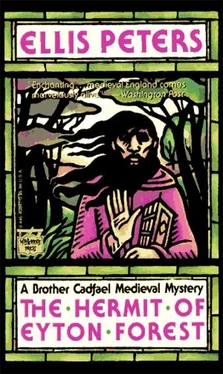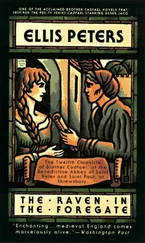Eilmund was a thickset, dark, shaggy man past forty, very powerful of body, and sharp enough of mind. He stood squarely in the midst at chapter, solidly braced on his sturdy legs like a wrestler confronting his opponent, and made few words of what he had to tell.
“My lord abbot, there are things happening in my charge that I cannot fathom. A week ago, in that great rainstorm we had, the brook that runs between our coppice and the open forest washed down some loose bushes, and built up such a dam that it overflowed and changed its course, and flooded my newest planting. And no sooner had I cleared the block than I found the flood-water had undercut part of the bank of my ditch, a small way upstream, and the fall of soil had bridged the ditch. By the time I found it the deer had got into the coppice. They’ve eaten off all the young growth from the plot we cropped two years ago. I doubt some of the trees may die, and all will be held back a couple more years at least before they get their growth. It spoils my planning,” complained Eilmund, outraged for the ruin of his cycle of culling, “besides the present loss.”
Cadfael knew the place, Eilmund’s pride, the farmed part of Eyton forest, as neat and well-ditched a coppice as any in the shire, where the regular cutting of six- or seven-year-old wood let in the light at every cropping, so that the wealth of ground cover and wild flowers was always rich and varied. Some trees, like ash, spring anew from the stool of the original trunk, just below the cut. Some, like elm or aspen, from below the ground all round the stump. Some of the stools in Eilmund’s care, several times cropped afresh, had grown into groves of their own, their open centres two good paces across. No grave natural disaster had ever before upset his pride in his skills. No wonder he was so deeply aggrieved. And the loss to the abbey was itself serious, for coppice wood for fuel, charcoal, hafts of tools, carpentry and all manner of uses brought in good income.
“Nor is that the end of it,” went on Eilmund grimly, “for yesterday when I made my rounds on the other side of the copse, where the ditch is dry but deep enough and the bank steep, what should have happened but the sheep from Eaton had broke out of their field by a loose pale, just where Eaton ground touches ours, and sheep, as you know, my lord, make nothing of a bank that will keep out deer, and there’s nothing they like better for grazing than the first tender seedlings of ash. They’ve made short work of much of the new growth before I could get them out. And neither I nor John of Longwood can tell how they got through so narrow a gap, but you know if the matron ewe takes a notion into her head there’s no stopping her, and the others will follow. It seems to me my forest is bewitched.”
“Far more like,” suggested Prior Robert, looking severely down his long nose, “that there has been plain human negligence, either on your part or your neighbour’s.”
“Father Prior,” said Eilmund, with the bluntness of one who knows his value, and knows that it is equally well known to the only superior he needs to satisfy here, “in all my years in the abbey’s service there has never yet been complaint of my work. I have made my rounds daily, yes, and often nightly, too, but I cannot command the rain not to fall, nor can I be everywhere at once. Such a spate of misfortunes in so short a time I’ve never before known. Nor can I blame John of Longwood, who has always been as good a neighbour as any man needs.”
“That is the truth,” said Abbot Radulfus with authority. “We have had cause to be thankful for his good will, and do not doubt it now. Nor do I question your skill and devotion. There has never been need before, and I see none now. Reverses are sent to us so that we may overcome them, and no man can presume to escape such testings for ever. The loss can be borne. Do what you can, Master Eilmund, and if you should feel in need of another helper, you shall have one.” Eilmund, who had always been equal to his tasks and was proud of his self-sufficiency, said thanks for that somewhat grudgingly, but declined the offer for the time being, and promised to send word if anything further should happen to change his mind. And off he went as briskly as he had come, back to his cottage in the forest, his daughter, and his grievance against fate, since he could not honestly find a human agency to blame. By some mysterious means young Richard got to know of the unusual purport of Eilmund’s visit, and anything to do with his grandmother, and all those people who had their labour and living about the manor of Eaton, was of absorbing interest to him. However wise and watchful his guardian the abbot might be, however competent his steward, it behoved him to keep an eye on his estate for himself. If there was mischief afoot near Eaton, he itched to know the reason, and he was far more likely than was the Abbot Radulfus to attribute mischief, however incomprehensibly procured, to the perversity or malice of humanity, having so often found himself arraigned as the half-innocent agent of misrule. If the sheep of Eaton had made their way into the ash coppice of Eyton not by some obscure act of God, but because someone had opened the way for them and started them towards their welcome feast, then Richard wanted to know who, and why. They were, after all, his sheep.
Accordingly, he kept a sharp eye open for any new comings and goings about the hour of chapter each morning, and was curious when he observed, two days after Eilmund’s visit, the arrival at the gatehouse of a young man he had seen but once before, who asked very civilly for permission to appear at chapter with an embassage from his master, Cuthred. He was early, and had to wait, which he did serenely. That suited Richard very well, for he could not play truant from school, but by the time the chapter ended he would be at liberty, and could ambush the visitor and satisfy his curiosity.
Every hermit worth his salt, having taken vows of stability which enjoin him to remain thenceforth within his own cell and closed garden, and having gifts of foresight and a sacred duty to use them for his neighbours good, must have a resident boy to run his errands and deliver his admonitions and reproofs. Cuthred’s boy, it seemed, had arrived already in his service, accompanying him in his recent wanderings in search of the place of retirement appointed for him by God. He came into the chapterhouse of the abbey with demure assurance, and stood to be examined by all the curious brothers, not at all discomposed by such an assault of bright, inquisitive eyes.
From the retired stall which he preferred, Cadfael studied the messenger with interest. A more unlikely servitor for an anchorite and popular saint, in the old Celtic sense that took no account of canonisation, he could not well have imagined, though he could not have said on the instant where the incongruity lay. A young fellow of about twenty years, in a rough tunic and hose of brown cloth, patched and faded—nothing exceptional there. He was built on the same light, wiry lines as Hugh Beringar, but stood a hand’s breadth taller, and he was lean and brown and graceful as a fawn, managing his long limbs with the same angular, animal beauty. Even his composed stillness held implications of sudden, fierce movement, like a wild creature motionless in ambush. His running would be swift and silent, his leaping long and lofty as that of a hare. And his face had a similar slightly ominous composure and awareness, under a thick, close-fitted cap of waving hair the colour of copper beeches. A long oval of a face, tall-browed, with a long, straight nose flared at the nostrils, again like a wild thing sensitive to every scent the breeze brought him, a supple, crooked mouth that almost smiled even in repose, as if in secret and slightly disturbing amusement, and long amber eyes that tilted upwards at the outer corners, under oblique copper brows. The burning glow of those eyes he shaded, but did not dim or conceal, beneath round-arched lids and copper lashes long and rich as a woman’s.
Читать дальше












